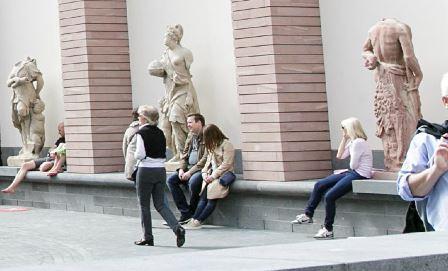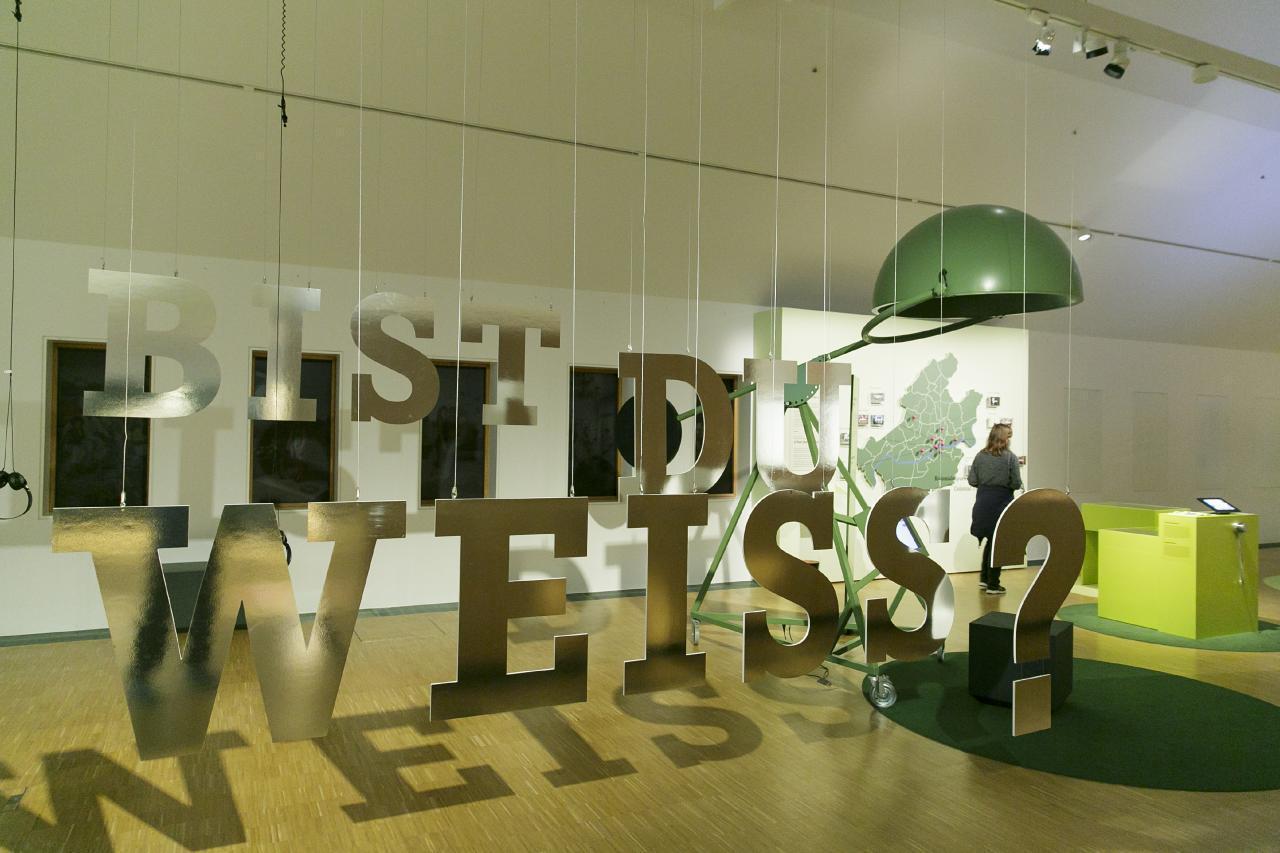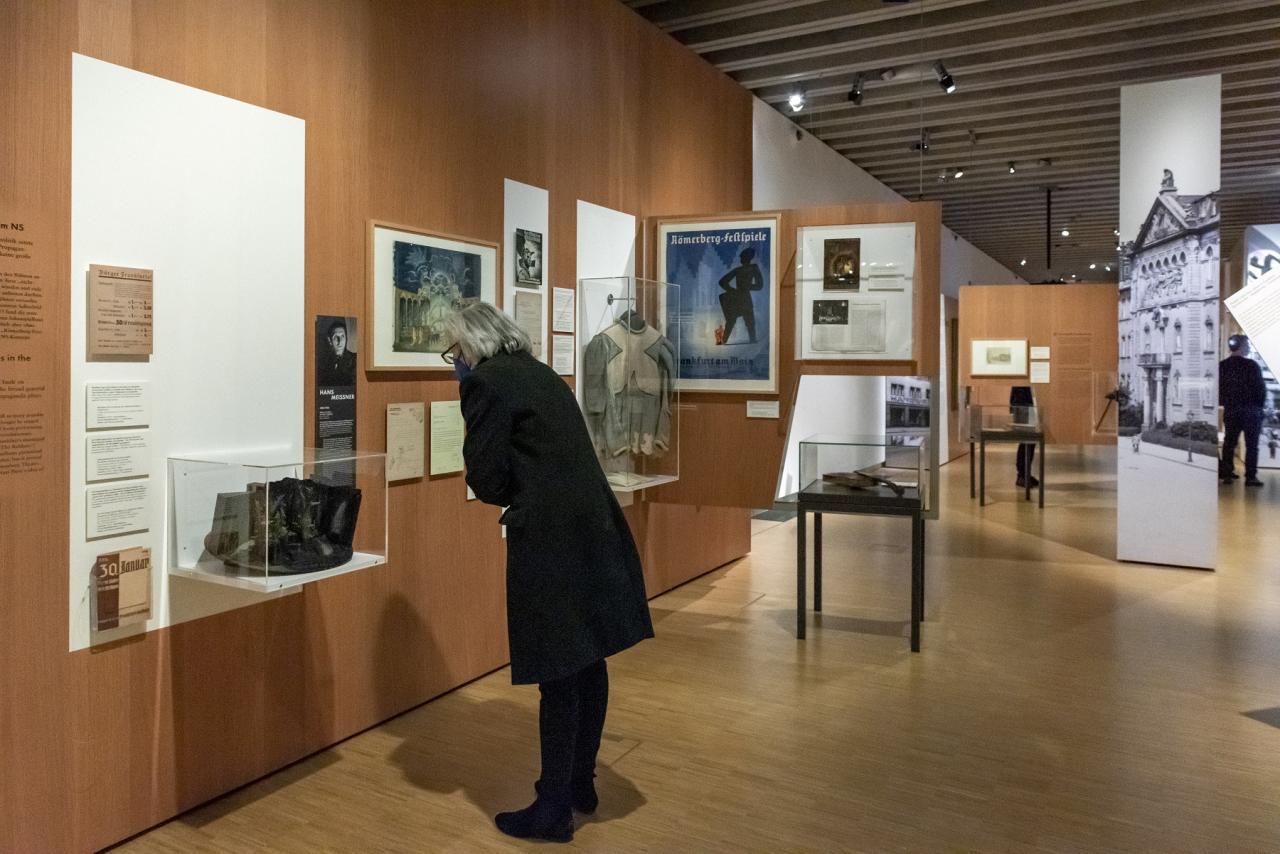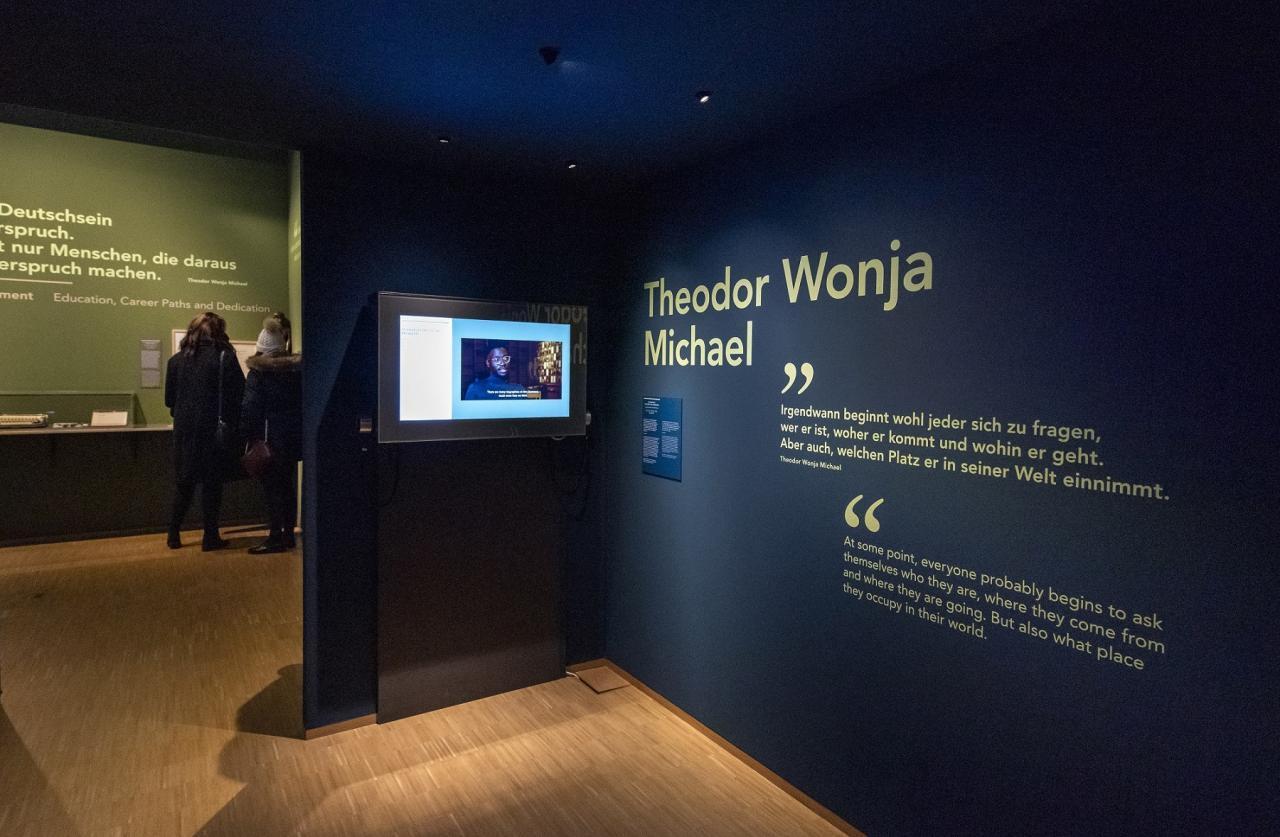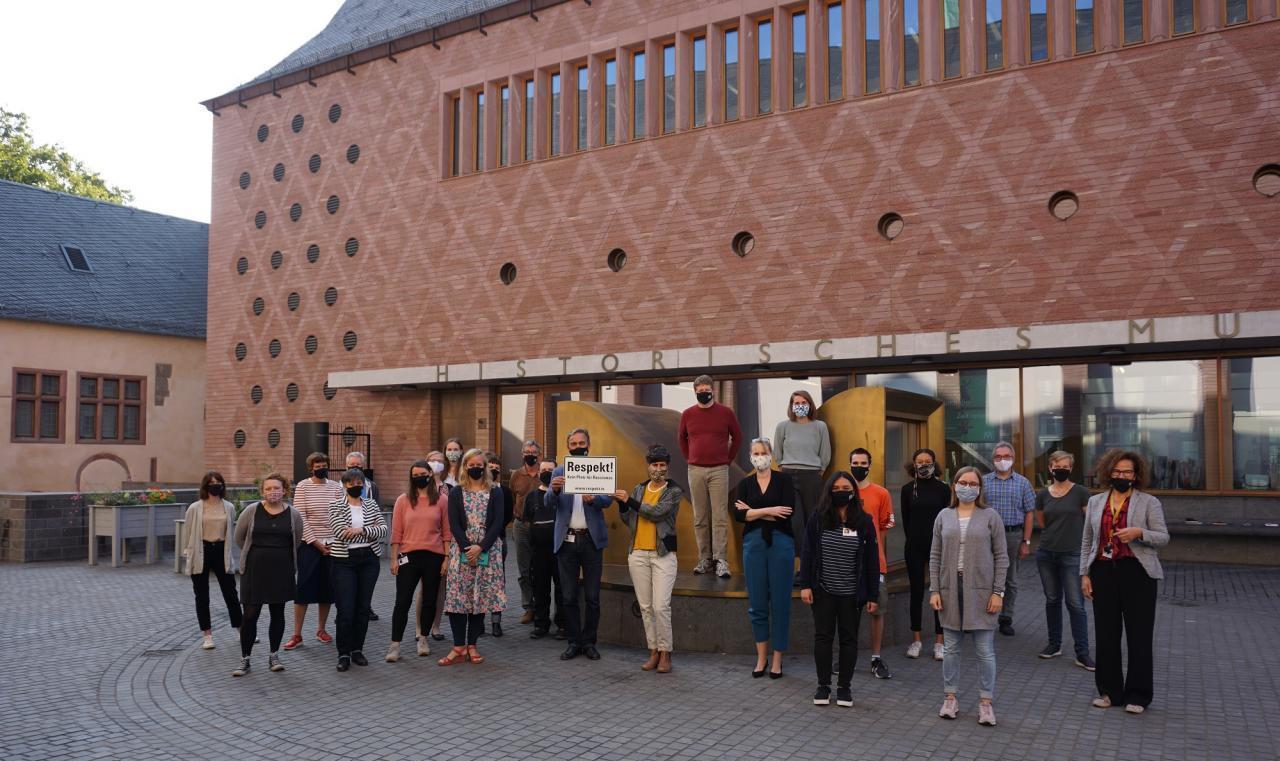
Anti-racism work at the HMF
Frankfurt against racism
A campaign to combat racism and right-wing extremism
Together with well over 50 cultural institutions and artists in Frankfurt, the Historisches Museum Frankfurt is one of the first signatories of the "Frankfurt Declaration of the Many" and has thus pronounced itself against racism, homophobia and transphobia, misogyny, anti-Semitism and Islamophobia. With this declaration, it emphasizes the importance of democratic and artistic freedom and plurality. Guiding principle
Within its new conception, the museum developed its guiding principle: multiperspectivity, diversity and inclusion are of central significance and the representation and empowerment of minorities is an important matter of concern. The diversity of the city society is to be reflected in exhibitions, collections and exchange. With Frankfurt Now! and the CityLab, the museum has created a participatory exhibition format and invites the community of Frankfurt to help shape the museum, set themes and develop exhibitions. The museum shares its interpretive sovereignty, it takes a multi-perspective stand and allows for subjective positions.Click here for the museum's guiding principle.
Young Museum
The exhibitions of the Junges Museum Frankfurt connects with the lifespace of young visitors, strengthens them in their rights and encourages them to ask questions and find their own place in the world. Exemplary are the exhibitions " Kinder haben Rechte!" (4/2017 - 1/2018), "OPPOSED!AGREED?Revolution.Making.History." (10/2018 - 3/2020) and "Childhood and youth during National Socialism" (in planning, 12/2021-3/2023). In cooperation with the Frankfurt Program - Active Neighborhood and the Youth Education Center, the open offer "Young Museum on the Road" has conveyed current exhibition topics to numerous neighborhoods since 1999.The Historisches Museum and the Junges Museum are cooperation partners of Places to See (Kulturamt), Kultüröffner (Amka) and Aktive Nachbarschaft (Dezernat Jugend und Soziales).
Click here to access the website of the Junges Museum Frankfurt.
CityLab
The CityLab is a participatory and present-oriented exhibition and event format initiated in 2010. CityLab projects are developed in close cooperation between the museum and the project participants. During exhibitions and events, social phenomena are addressed on the basis of subjective experiences. The representation of marginalized groups is a central concern. Implementing migration history as part of German history is one of the strategies pursued by the CityLab.
I Spy with My Little Eye. Racism. Resistance. Empowerment (9/2020 - 2/2021): CityLab exhibition with a multifaceted supporting program and symposium.
The CityLab exhibition was dedicated to the various forms of racism and their effects on victims. Furthermore it showed how people offered resistance and what strengthens them. Personal experiences of racism, postcolonial issues as well as resistance movements and empowerment strategies were highlighted. The exhibition also pointed towards German colonial history, its perpetuation and asked some uncomfortable questions about the present. Here the focus is on social recognition, i.e. visibility and enabling visibility, speaking and being heard, and critical self-reflection.
The supporting program of the exhibition was also dedicated to the core issues of racism, resistance and empowerment. There were panel discussions, storytelling, city tours and performances. It primarily gave people who experience racism a platform to share their perspectives and realities of life. The exhibition ended with a symposium on empowerment sharing. The conference offered spaces for input, reflection and exchange on solidarity and racial criticism of the present.
You can find the CityLab here.
Provenance research
The HMF has been researching the provenance of its collections since 2010. This is based on the Washington Declaration of December 3, 1998, i.e. the "Principles of the Washington Conference Concerning Works of Art Seized by the National Socialists". Germany has thus also committed itself to conscientiously examine and implement the restitution or compensation for collection items seized as a result of Nazi persecution. The background of most of the expropriations by German authorities during the NS were racist laws or actions. With its research, conducted even without concrete demands for restitution, the museum has simultaneously committed itself to the revision of racial criticism within its own history.
More information on provenance research at the HMF can be found here.
Programme 360°
The museum participates in the 360° programme of the Federal Cultural Foundation: For a period of four years, the position of an agent was established to act as an interface between the museum and the diversified urban society. Two people share this task. They develop a sustainable basis for the museum's work, upon which the highly diversified urban society can find itself reflected throughout the museum. This refers to the exhibition and event programme, the networking between the public and the staff, as well as the training of the museum staff on topics of racial criticism. The two agents thus support the museum in its internal and external diversification. The development of a discrimination-sensitive approach to language and the representation of minorities as well as a critical examination of the collections play a role here. Currently, the diversity agents are working together with various migrant and activist initiatives of Frankfurt on the participatory CityLab exhibition entitled "I Spy with My Little Eye. Racism, Resistance and Empowerment".
Click here to visit the HMF's "Awards" page, including the funding programme 360° ─ Fund for New City Cultures.
Themed Tours
On the basis of several themed torus, visitors can delve into various topics along an approximately 90-minute tour at the HMF: The tour "Frankfurt 1933-45" leads to exhibits at the HMF which are linked to the National Socialist era, with an emphasis on the permanent exhibition "Frankfurt Once?". The thematic booklet "Frankfurt on the Move. A City with a Migration Background" leads to stations in the HMF, showing that Migration has constantly left its mark in Frankfurt since the 12th century and up to the present day.
Click here for the Themed Tours, which are also available for download.
Multimedia guide
The HMF's multimedia guide (WebApp) not only offers contributions developed by the curators for usage in the museum. Different tours also offer visitors various perspectives on the city and its history: In the tour "Multiperspectivity in the museum," nine refugee academics and six students from the Goethe University Frankfurt tell unusual stories about historical museum objects. They placed their own professional and personal interests at the center of their reflections. As a result, 17 creative narratives were produced, some being critical, some amusing, and some touching with their intensity.
The tour "Museum inklusiv" tour was developed as a joint project with the Praunheimer Werkstätten. Ten people with intellectual disabilities researched eleven exhibits, wrote texts, developed presentations and stood in front of the camera.
Both projects were also about giving people from marginalized groups a voice in the public.
Click here for the HMF's multimedia guide.
Intervention trail
The art intervention tour "Change of View – Tracing Racism" focusses on German colonial history and its continuing effects to this day. Traces from the 16th to the early 20th century can also be found in Frankfurt. Until today, imperial and colonial concepts still have a continuous impact in form of racism and structural excklusion. Traces of these can also be found in the exhibitions and collections of the Historical Museum – at times more obvious, sometimes less so: In particular this is reflected in form of racist depictions and texts on exhibition objects. Or there are gaps as people and their narratives have been consistently left out. With 18 art interventions, the participatory project adds critical reflections and new perspectives to the exhibits.
Artists and activists of Color comment on, change and complement selected objects and their stories with their contributions to the exhibition. They present their critical view on the transmitted stories in the museum via artistic means. The tour is predominantly articulated from the perspective of non-white and intersectional positions. In their role as co-curators, they offer insight into experiences of racism and stereotyping descriptions. Strategies of self-empowerment and resistance are employed, in addition to uncovering racism. In this sense the interventions encompass a spectrum of fictional narratives, ironic additions, comparisons and protest campaigns, as well as superimpositions of individual museum objects. Find out more about the tour here.
Library of Generations
The Library of Generations is an artistic, intergenerational memory project by Sigrid Sigurdsson. Contributions from individuals, groups and initiatives are collected over 105 years. The project should act as an intermediary to overcome the silence concerning National Socialism, to enable a mediatized dialogue between generations. Many contributions come from contemporary witnesses or from "trace seekers". In recent years, attention has been given to the integration of migrant and marginalized positions when recruiting new participants.
Click here to find out more about the Library of Generations.
Workshops
Representation of Black People in Exhibitions
As part of a research internship, an intern investigated the representation of Black people in paintings in the HMF exhibition. Three paintings (16th-18th century) were analyzed: "Das Mainufer am Fahrtor" (1757) by F. W. Hirt, "Eine reich gekleidete Dame am Fenster mit schwarzem Pagen" by Caspar Netscher (second half of the 17th century, in Morgenstern's Miniaturkabinett III) and "Das Jüngste Gericht" (around 1630, accredited to Philipp Uffenbach). The focus was on the question where and in which context Black people were visible. The results are part of the art intervention "Blickwechsel – dem Rassismus auf der Spur".
Project week "City of Diversity"
The HMF is involved in the project "Frankfurt - City of Diversity", which various historical institutions and museums in Frankfurt offer each school year for several school classes. Along various modules in the institutions, which are individually arranged for the learning groups, the focus is on questions such as: What did migration mean to people in earlier times? And how did these migrations shape the history of Frankfurt and the Rhine-Main region? The historical institutions and museums of the city of Frankfurt offer an invitation to research on the migration of people, objects and ideas.
Exhibitions 2021-23: Frankfurt and the NS
Frankfurt and National Socialism: special exhibition, CityLab and JuM exhibition.
Since December 2021, the HMF has been presenting a hitherto unprecedented exhibition project: The HMF has dedicated the topic of "Frankfurt and the NS" via three formats. 75 years after the liberation of the city by the US tropps, Nazism and its aftermath is unfortunately a highly topical issue, as right-wing extremist attacks, parties and propaganda show. How the city, considered to have been liberal and democratic beofore 1933, with the highest Jewish population count in the Reich, was able to align itself so quickly and radically with the NS, and how sluggishly the evaluation process of the NS era has been, are the central questions of the three exhibitions.
Click here for more information on the exhibitions on "Frankfurt and Nazism"
Biographical Cabinet Theodor Wonja Michael: Being Black and German – a contradiction?
Presentation in the biographical cabinet in the permanent exhibition "Frankfurt Once?" at the Historisches Museum Frankfurt since November 24, 2021
The exhibition goes in search of traces of German history from a hitherto hardly mentioned Black perspective: Theodor Wonja Michael was born in Berlin in 1925 as the child of a Cameroonian father and a Prussian mother. When the National Socialists came to power, he found himself in a country showing increasing hostility to him. Still little is known about the lives of Black Germans in Frankfurt before, during and after National Socialism. Yet the racial ideology of the 20th century also had far-reaching consequences for them.
Michael's eventful life, including a career as an editor and as the first Black German in high service at the BND, highlights the obstacles and opportunities for Black people in Germany. Learn more about the biographical cabinet here.


